HTC 10 vs LG G5
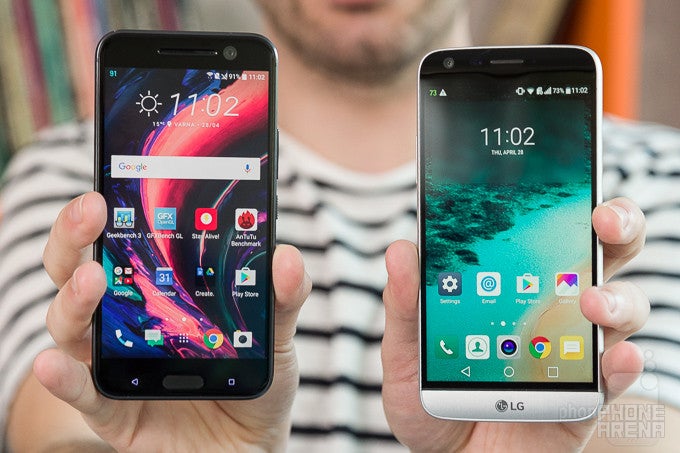
Introduction
The HTC 10 is probably the first phone of HTC's flagship line that offers a very well-rounded package without perceivable weak points. HTC has been traditionally great in outer appearance, and this tradition has been further refined with the 10, but under the hood its last few high-end phones always left something to be desired, especially in the camera department.
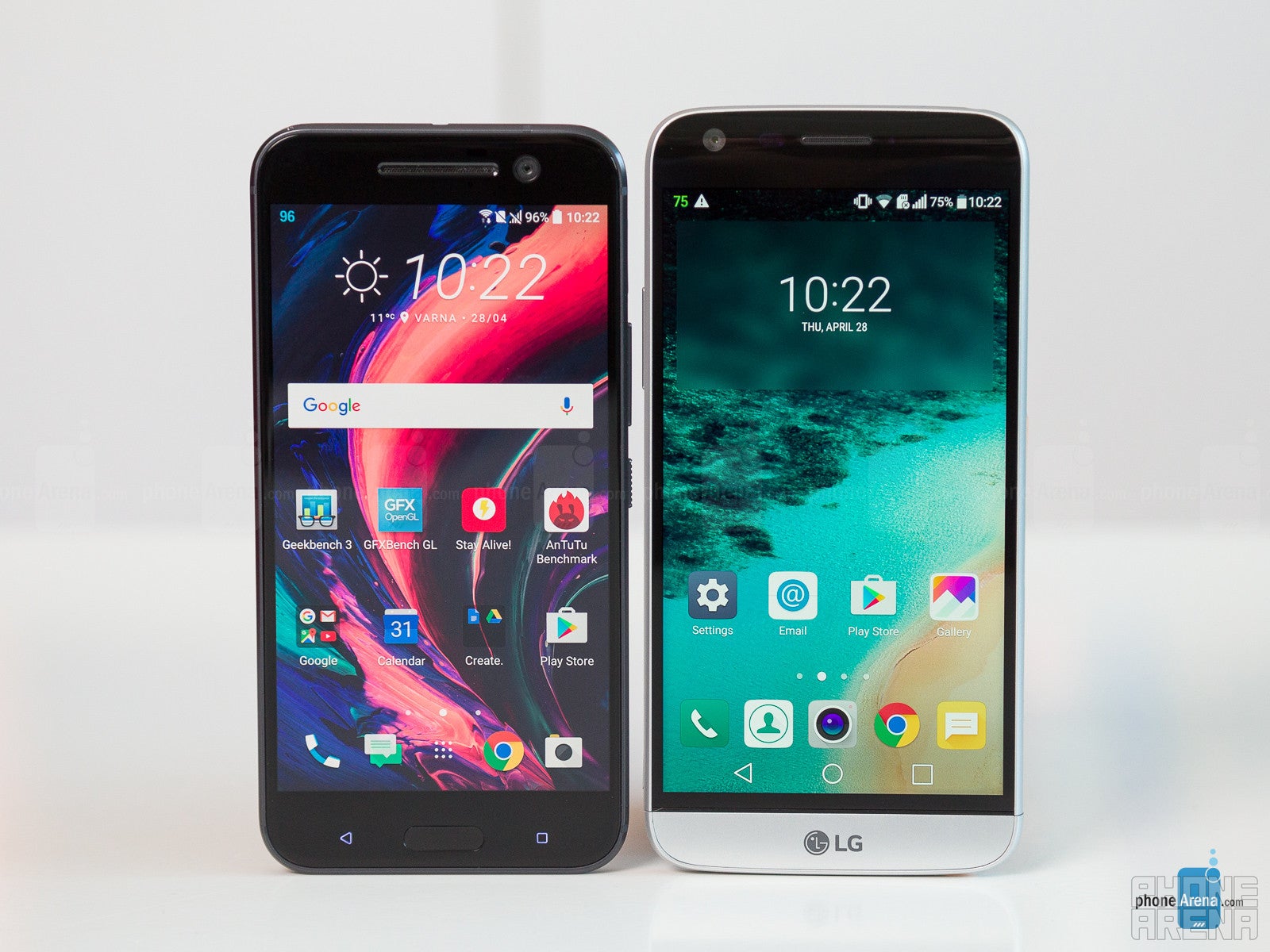
Design
Uninspiring design, but par excellence build quality for the HTC 10 goes against a larger, flimsier modular chassis on the G5.
HTC has always been a designer darling, making phones with full metal jackets before metal became the new plastic. It therefore didn't need to change much in the exterior of its newest high-end model to remain on the “premium” bandwagon, and yet it did introduce a little something extra – chamfered edges of the aluminum rear that make the 10look rather sophisticated.
LG, on the other hand, made a soapy aluminum phone with rounded corners, which is nevertheless slim and light, regardless of the modular design. We say modular, as the G5 sports a detachable bottom, making it feel flimsier when handled. The detachable half lets you swap the battery, which is a rare feat in flagships these days, or you can add various media-centric and other accessories that LG calls Friends.
HTC has been eschewing finger scanners so far, but the situation became unbearable last year, so it was forced to include a traditional one, placed in the capacitive home key beneath the display. LG has chosen a bit more unorthodox placement, as it's housing said button on the back, embedded in the lock/power key there. It feels a bit weird to just tap the HTC home key instead of clicking it in, as it looks like a physical one, but not weirder than placing said button on the rear, like LG did, so we can call it a draw.
As for tactile feedback, the lock keys have it deep and well, and HTC's sturdy metal power button even has toothed surface for easier recognition when you search to press it without looking. The volume rockers are another matter, though – that of HTC is solid, with hearty tactile feedback, while on the G5 the rocker feels a bit shallow, overly thin, and flimsier.
Display
HTC placed a 5.2” 1440 x 2560 pixels Quad HD display on the 10, instead of the Full HD panels it used before. It's a Super-LCD 5 one, and goes against the 5.3” LCD display at the G5's front with the same pixel count. While the resolution is plenty for those screen sizes, LG does differentiate with something a bit extra – an always-on feature that powers up a small section of the screen to display date, hour and pertinent notifications, though it consumes more battery in the process.
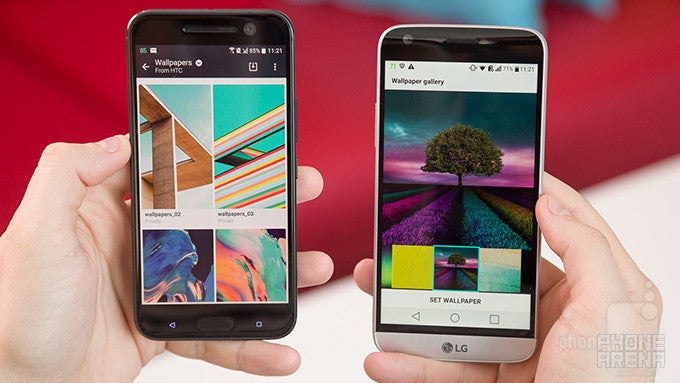
As for the screens' quality, they are both equally ho-hum in color presentation, as they lean towards the cold side of the spectrum, with unnatural hue saturation. That's not something the average user would be too irked about, though. Outdoors, the HTC 10 tends to be just a bit brighter than its counterpart, but both could do a lot better.
Interface
HTC nails clean and common Sense in the ragtag Android overlay business.
The newest Sense 8 interface on the HTC 10 is wrapped around Android Marshmallow, but doesn't change it all that much in terms of looks and functionality, as HTC has taken a more minimalistic approach than in the LG G5's UX 5.0 interface.
Besides flat and colorful Material Design styling, à la Google Nexus, HTC cleaned up the annoying duplicate essential apps that most other manufactures still have in their overlays. You don't get two galleries, to say the least. It still left plenty of customization options, though, like a rich Themes app, and the BlinkFeed homescreen, which integrates news, social media feeds, and contextual awareness, while running smooth as silk. Another interesting new take is the Freestyle layout that allows you to customize the home screen theme by assigning app shortcuts to different stickers, as well as hide app labels altogether and create a sleek theme with shortcuts hidden in plain sight. Cool.
LG introduced a revamped user interface with the G5 and its latest Android 6.0 Marshmallow build, and now calls it UX 5.0 home screen. The whole UI feels a bit more polished than before, but it's not particularly inspiring just yet.
Besides the new coat of paint, LG has tinkered with the functionality, too. There is no app drawer by default, meaning all your apps will be plastered over your homescreen à la iOS. The Dual window split-screen multitasking has also been nixed, as we have a smaller screen real estate to work with now.
Processor and memory
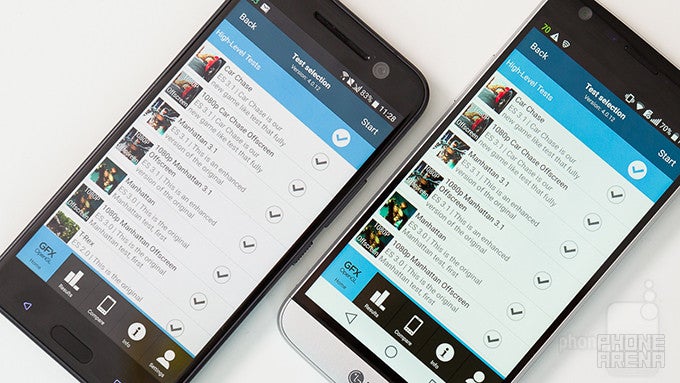
The processor inside the LG G5 and HTC 10 is the same – Snapdragon 820 – and both devices sport 4 GB of RAM. Both phones feel quite speedy, and thanks to the cutting-edge CPU and GPU ticking inside, they can run easily run whatever you may think of.
There are 32GB of storage inside the G5, plus support for a microSD card of up to 200GB, which, however, eschews Android's adoptable storage option, so the phone will always display the internal and added memory as separate entities. The HTC 10 does support adoptable storage, while internal memory can be either 32, or 64 GB.
Browser and connectivity
LG and HTC both went with Android's default Chrome browser, and we can't blame them, as Google is constantly working to improve Chrome.
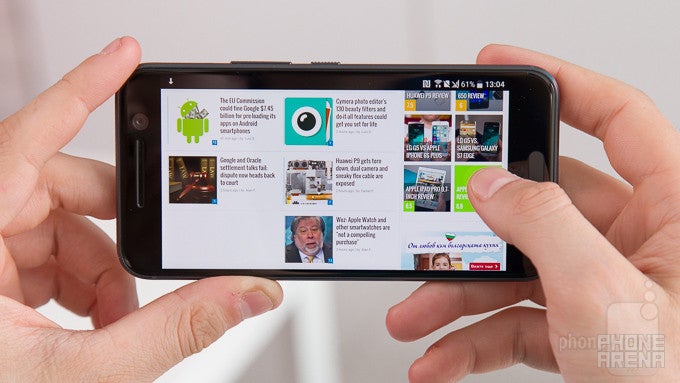
Google Chrome is the default browser on the HTC 10
As for connectivity – well, the handsets are loaded with network compatibility and support for most Wi-Fi, Bluetooh, GPS or NFC wireless radio standards under the sun. HTC's phone is the first to support AirPlay, though - an Apple streaming technology – integrated on the system level instead of via a third party app. The HTC 10 does have LTE Cat. 9, though, giving it up to 450 Mbps download speeds, instead of 300 Mbps. Still, the number of LTE bands it covers is less than on the G5, at least for the US carrier versions, where AT&T is conspicuously absent, unless you buy the unlocked 10 version straight from HTC itself. That unlocked version won't grant you access to the Sprint network, too, so you'll have to grab the dedicated carrier version.
Both LG and HTC equipped their flagships with the modern USB Type-C reversible connector, so don't forget to always carry the cable with you when traveling, as you can't charge them with a regular microUSB one. LG, however, supplied a connector with the latest USB 3.1 standard, so file transfers to and from it can be faster.
Camera
The G5's camera shines with truer colors, better exposure, and top-notch audio recording to the footage.
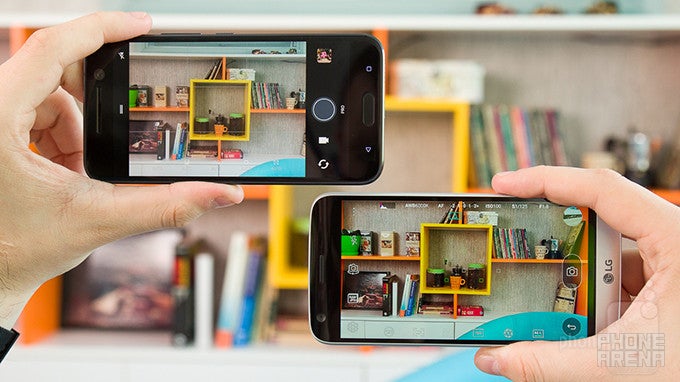
HTC is going with a 1/2.3”, 12-megapixel sensor with large, 1.55μm pixels and wide, f/1.8 lens. Combined with optical stabilization and laser AF, these parameters suggest great light sensitivity for when you're shooting in the dark. Up front, we're looking at an equally compelling, 5-megapixel selfie camera, also with optical stabilization—a first with front-facing snappers, and a boon for club photos.
You can launch the camera by simply swiping downwards twice—even when the phone is asleep—or by dragging the camera app icon into the middle of the lockscreen. As for the interface, it's more minimalist than ever before and absolutely down to the point. Save for the dedicated Pro mode, which gives you manual control over variables such as ISO and shutter speed, it's a really clean execution overall.
On the G5, LG uses a unique dual camera setup that employs two lens modules – one with a 16 MP, and one with an 8 MP sensor. Up front, we're dealing with an 8-megapixel selfie snapper – sorry, no optical stabilization. The two units on the G5 are set apart by the dual LED flash in the middle, and the laser autofocus system. The main, 1/2.6” 16-megapixel camera has a typical 1.12μm pixel size, but wide, f/1.8 aperture and optical stabilization. The extra 8-megapixel unit, however, comes with extremely wide field of view – 135°, or more than that of the human eye. It's intended for when you want to capture a very wide scene and you can't physically move back to fit it all.
The camera software of the phone lets you switch between the two sensors with a single tap, the idea being that you'd use the two cameras for different compositions. The secondary sensor allows you to capture scenes that you'd otherwise have to use the panorama option for. On the camera app side, the G5 sports a clean, outlined iconography, yet gives you a full manual mode, and funky regimes like Snap (Vine-like video capture mode where you can pause/start for up to a minute) and Popout (layers a shot from the main camera on top of a slightly transparent background from the wide-angled one).
When it comes to quality, the HTC delivers a bit too warm color presentation, while the G5's photos correspond better with what's really in front of the lens. The LG's shots are also slightly better exposed and capture more detail in the frame, though the tradeoff is a tad more noise. In low-light scenarios, the HTC 10 blows up the scene a bit too much, meaning that night shots look like they've been shot at dusk, and there is noticeable halo around brighter regions like lamps or headlights. Overall, the G5 comes out slightly ahead, as it produces very credible photos in terms of color, with no excessively cold or warm overcasts.
In terms of video, both phones can record 4K footage. The phones manage to capture excellent clips in almost all situations, with a bit too warm colors from the HTC phone, and a tad darker exposure than needed. The imagery runs fairly steady, more so in the case of the G5, yet both phones had their focus wandering a few times while panning around, as well as a few skipped frames. The G5 recorded excellent audio, as we are able to hear our narration loud and clear despite the surrounding noise, while our voice came out muffled with the HTC 10, drowning in the ambient sounds.
Multimedia
Тhe stock photo gallery on the G5 offers some quick editing options like cropping and basic effects, and that's about it. HTC offers the stock Google Photos gallery, which offers a bit more editing features, as well as cloud storage with auto-sync. For videos, LG's player has the upper hand when it comes to extra features like adding subtitles, as HTC makes do with the basic Android player, yet it offers the editing powers of Zoe video, which can make a highlight reel of your footage, complete with vintage effects, trimming, and so on.
Call quality

Call volume with the G5 is very good on both ends, and people's voices are recognizable even if one were to blindly answer calls. On the downside, these voices sound a tad flat and robotic. Thankfully, the earpiece is large enough to ensure that even as you shift the G5's position over your ear, you're still getting audible convos.
Battery
With a 3000 mAh battery, the HTC 10 scored 7 hours and 10 minutes in out proprietary test, which is a commendable achievement, especially compared to the previous editions in the line. That result is not far off the Galaxy S7, and will have your phone last the proverbial day and a half with moderate usage. You can perhaps eke out HTC's promised two-day battery, but only if you tap the phone occasionally.
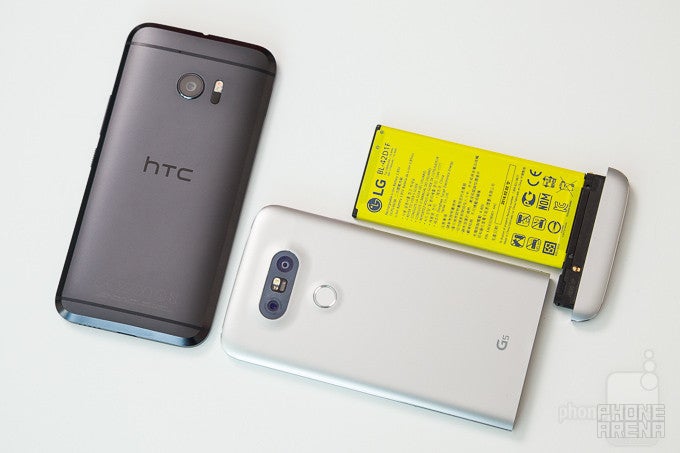
The HTC 10 does comes with a Qualcomm Quick Charge 3.0-compliant, 2.5A charger, but that gets it 100 minutes of charge to full – hardly an outstanding achievement, but not too shabby either. For comparison, the G5 is able to juice up for 75 minutes only, though it does have a smaller, 2800 mAh battery.
That smaller juicer, and the powerful components, make LG's phone battery prowess quite middling. It eked out only 5 hours and 51 minutes of screen-on time in our standardized test, so it will probably get you through the day, and that's that. On the plus side, you can carry a spare, and swap at convenience.
Conclusion
The HTC 10 is the finest phone in a line that was getting a bit long in the tooth, with no real weaknesses that are worth mentioning. It's well-designed, with fast software, much improved camera, and a traditional stress on audio prowess. The LG G5, however, often does better in most scenarios that matter, save for the battery endurance, which is an issue that its modular design may help overcome.
HTC priced its creation a tad higher than the G5, but given that LG has had its puppy on the market for a little while, the tags will likely even out later on. Overall, HTC produced a very good all-around device, while LG tried a bit too hard to set the G5 apart with the modular design concept. Of the two, the HTC 10 is the smartphone we'd go for, but most of the time, the G5 offers a pretty comparable experience.
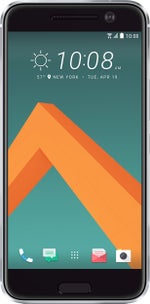
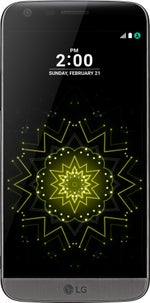


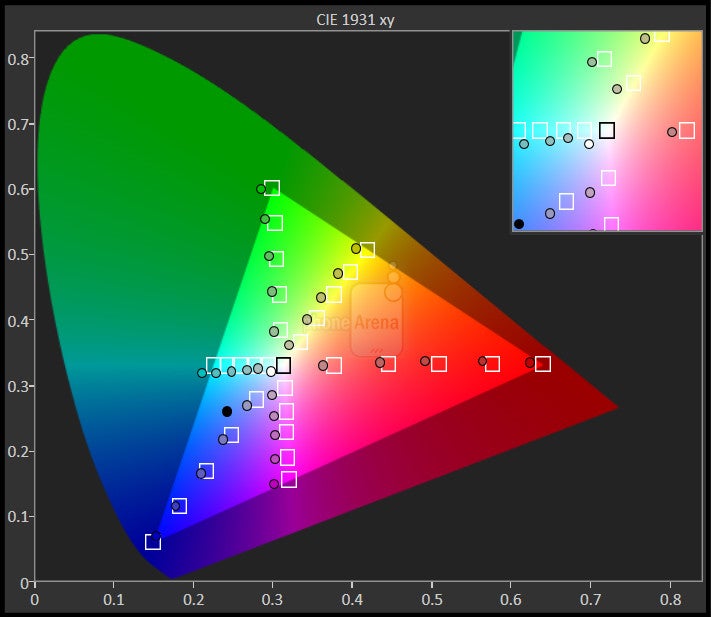






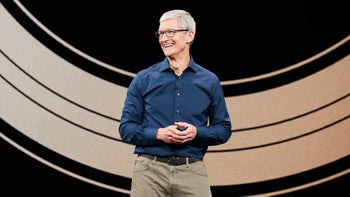
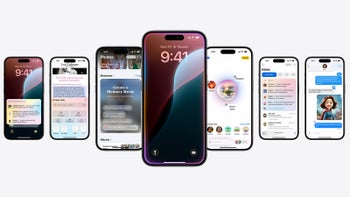
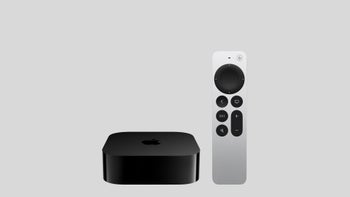
![iPhone users on AT&T left without service after massive outage [UPDATED]](https://m-cdn.phonearena.com/images/article/161893-wide-two_350/iPhone-users-on-AT-T-left-without-service-after-massive-outage-UPDATED.jpg)
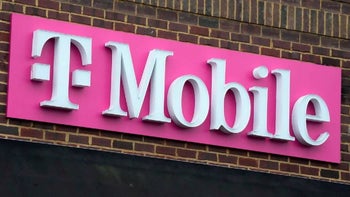
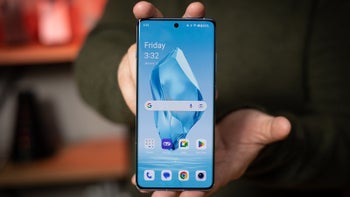
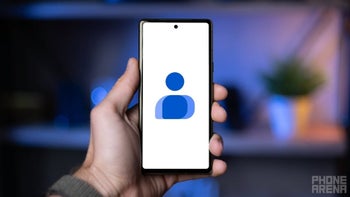
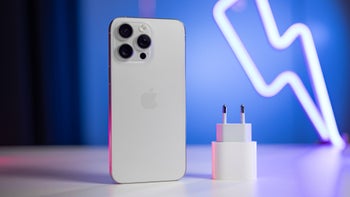










Things that are NOT allowed: